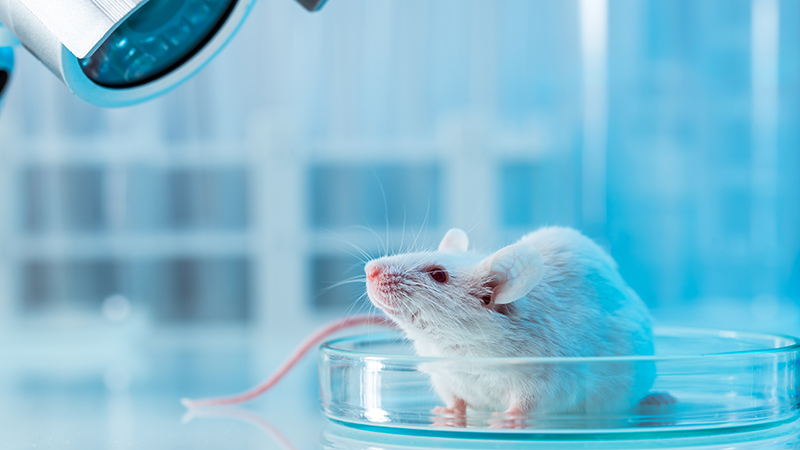Physicians Committee Works to Address Animal Methods Bias in Scientific Publishing
Animal methods bias in publishing is a preference for animal-based research methods by journal reviewers or editors that affects the likelihood of a study being accepted for publication.
Publication of research findings helps disseminate scientific and medical information to other researchers, policymakers, and the public. In addition, researchers are under extreme pressure to publish their work to ensure more funding and career security. The current publication process helps sift out poorly conducted research from reliable, rigorous research–though there are notable areas of weakness, including animal methods bias.
According to the Catalogue of Bias, a database created by The Center for Evidence-Based Medicine at Oxford University, publication bias is “when the likelihood of a study being published is affected by the findings of the study.” The classic case of this is when researchers test a hypothesis but find no meaningful results, which may lead to the study not being published. But what if the likelihood of a study being published is affected not by the results, but by the way the study is conducted – the methods of the study? In particular, what if the likelihood of a study being published is affected by the use of either animals or nonanimal methods?
Recently, early evidence of this, what we’re calling an animal methods bias, has emerged. In biomedical research, data from animal experiments is still considered the "gold standard,” even though human-specific methods like tissue chips and organoids can better replicate human tissues and are more predictive of human health outcomes than animals. The hallmark of animal methods bias is when journal editors or peer reviewers request that research on animals is conducted as a misguided attempt to confirm existing findings from human-based methods. Sometimes journals even require this animal research as a condition for publication.
We define animal methods in publishing bias as a preference for animal-based methods, which affects the likelihood of a study being accepted for publication. This bias may affect many other aspects of medical research, like the review of grant application, hiring decisions, even the very infrastructure that supports medical research. In the context of publishing, this is a problem because it may lead to scientists performing animal experiments in haste that lack rigor or justification, all for the purpose of appeasing editors or reviewers. And it stands in the way of the uptake of more ethical and physiologically relevant human-based methods.
To gather preliminary evidence for the occurrence of this bias, we partnered with Humane Society International to conduct a small survey to understand the experiences of scientists in the context of peer review related to animal and nonanimal methods. Highlights of the survey included that some respondents have performed animal-based experiments for the sole purpose of anticipating reviewer requests for them, as in, they didn’t think the experiments were necessary outside the context of review. Some respondents have been asked by reviewers to add animal-based experiments to a study that otherwise had no animal experiments, and many of those respondents did not feel the request was justified.
We found that potential sources of animal methods bias in publishing are a reviewer’s personal preference for animal-based methods or a lack of awareness of appropriate nonanimal methods for a given hypothesis. And we found that potential consequences of animal methods bias in publishing are delayed time to publication, rejection or withdrawal of papers, publishing in lower impact journals, and performing unjustified animal experiments.
To further explore animal methods bias in publishing, the Physicians Committee recently brought together diverse stakeholders for a virtual workshop. The charges for the workshop were to: (1) explore a range of stakeholder perspectives, including from academic and industry researchers, journal editors, government representatives, and advocates, (2) describe the current state of animal- and nonanimal-based experimental systems, (3) describe animal methods bias in publishing and related biases in publishing and peer review, and (4) identify potential causes, consequences, and potential mitigation strategies for animal methods bias in publishing.
Workshop participants joined us from all over the world, including Brazil, Italy, Spain, the UK, and India. We heard from a wide array of experts in nonanimal methods, including Dr. Don Ingber, who is a pioneer of human organ chips. We learned from editors how journals have been identifying and addressing publishing biases and from experts in alternative forms of scientific dissemination, like open science, and how they might help address publishing biases. And we held working sessions where participants were able to identify barriers and think through potential solutions in real time.
Recommendations to address animal methods bias that emerged from the workshop included: building awareness about animal methods bias, educating editors and reviewers about the relevance of nonanimal methods, implementing open science and open review, prioritization for nonanimal methods by funders, changing regulatory requirements, and more.
The workshop was a huge success. We generated an ongoing taskforce of different experts and groups that are committed to addressing animal methods bias. Our next steps are to build more evidence through a larger survey, to share these findings with editors and funding agencies like the National Institutes of Health, and to urge them to take action. Ultimately, researchers who use innovative nonanimal methods shouldn’t be punished by conservative attitudes that aim to uphold the animal research status quo. Rather, they should be empowered to share their findings – patients and animals depend on it.









